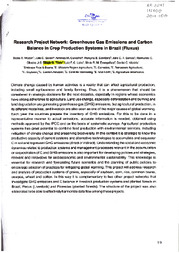Research project network: greenhouse gas emissions and carbon balance in crop production systems in Brazil (Fluxus).
Research project network: greenhouse gas emissions and carbon balance in crop production systems in Brazil (Fluxus).
Author(s): MADARI, B. E.; SALTON, J. C.; CARVALHO, A. M.; SCIVITTARO, W. B.; SANTOS, J. C. F.; OLIVEIRA JUNIOR, R. C.; TOSTO, S. G.; LEITE, L. F. C.; EVANGELISTA, S. R. M.; VICTORIA, D. C.
Summary: Climate change caused by human activities is a reality that can affect agricultural production, including small agribusiness and family farming. Thus, it is a phenomenon that should be considered in strategic decisions for the next decades, especially in regions whose economies have strong adherence to agriculture. Land use change, especially deforestation and burning and land degradation are generating greenhouse gas (GHG) emissions, but agricultural production, in its different modalities, and livestock are also seen as one of the major causes of global warming. In this context it is strategic to know the productive capacity of current systems and alternative technologies to accumulate and sequester C in soil and to prevent GHG emissions (direct or indirect).
Publication year: 2011
Types of publication: Abstract in annals or event proceedings
Unit: Embrapa Rice & Beans
Keywords: Carbon, Greenhouse gases, Mudanças climáticas
Observation
Some of Embrapa's publications are published as ePub files. To read them, use or download one of the following free software options to your computer or mobile device. Android: Google Play Books; IOS: iBooks; Windows and Linux: Calibre.
Access other publications
Access the Agricultural Research Database (BDPA) to consult Embrapa's full library collection and records.
Visit Embrapa Bookstore to purchase books and other publications sold by Embrapa.

